One Leader Under God: The Connection Between Authoritarianism and Christian Nationalism in America
Executive Summary
Growing concerns about the appeal of an authoritarian leader in the United States led PRRI to conduct a new survey of more than 5,000 Americans that revisits long-established measures of authoritarianism and their relationships to Christian nationalism, examines Americans’ commitment to democratic values and willingness to accept political violence, and explores how authoritarian attitudes are linked to views about immigrants and immigration, cultural change, gender roles, and patriarchy.
Relying on two classic approaches to measure authoritarianism, PRRI finds that most Americans do not hold highly authoritarian views.
- Revisiting work first developed in The Authoritarian Personality (1950) and later adapted into the Right-Wing Authoritarianism Scale (RWAS), PRRI finds that 43% of Americans score high on the RWAS, compared with 37% who score low; two in ten Americans qualify as having mixed opinions (20%).
- Around four in ten Americans (41%) score high on an alternative measure of authoritarianism (CRAS) that relies on child-rearing preferences and is less closely associated with conservative political ideology. This is a drop from 57% of Americans who scored high on the CRAS in a previous 2016 PRRI national survey.
Right-wing authoritarian views are more prevalent among Republicans, particularly those who hold favorable views of Trump, white evangelical Protestants, and weekly churchgoers.
- Two-thirds of Republicans score high on the RWAS (67%), compared with 35% of independents, and 28% of Democrats.
- Republicans who hold favorable views of Trump are 36 percentage points more likely than those with unfavorable views of Trump to score high on the RWAS (75% vs. 39%).
- White evangelical Protestants (64%) are the religious group most likely to score high on the RWAS, followed by slim majorities of other Protestants of color (55%), Hispanic Protestants (54%), and white Catholics (54%). A majority of weekly churchgoers (55%) score high on the RWAS, compared with 44% of Americans who attend church a few times a year and 38% of those who never attend church services.
Republicans score high on the Child-Rearing Authoritarianism Scale (CRAS), as do a majority of Black Protestants; church attendance and less formal education are also linked to higher scores.
- A majority of Republicans (54%) score high on the CRAS, compared with one-third of independents (34%) and Democrats (32%).
- Republicans who hold favorable views of Trump are more likely than those with unfavorable views to score high on the CRAS (57% vs. 41%).
- The majority of Black Protestants (57%), other Protestants of color (55%), and white evangelical Protestants (54%), as well as Americans who attend religious services at least once a week (51%), score high on the CRAS.
- Less education is correlated with higher CRAS scores: nearly half of Americans who have not graduated from college (47%) score high on the CRAS, compared with 29% of college graduates.
There is strong overlap among Americans who hold Christian nationalist and authoritarian views.
- Similar to earlier PRRI studies, three in ten Americans identify as either Christian nationalism Adherents (10%) or Sympathizers (20%).
- Strong majorities of Christian nationalism supporters (Adherents and Sympathizers) score high on both the RWAS (74%) and CRAS (61%), more than double the rates of Christian nationalism Skeptics and Rejecters (30% and 31%, respectively).
- Among those who score high on the RWAS, the majority qualify as Christian nationalism supporters (51%) or score high on the CRAS (56%). By contrast, among those with low RWAS scores, just 7% are Christian nationalism supporters and 21% score high on the CRAS.
- Among those with high CRAS scores, 44% qualify as Christian nationalism supporters and 59% score high on the RWAS. By contrast, among those who score low on the CRAS, 14% qualify as Christian nationalism supporters and 25% score high on the CRAS.
Most Americans disagree that those convicted of crimes from Jan. 6th are being held hostage by the government or that Trump should do whatever it takes to be President if he is not declared the winner in 2024; authoritarians and Christian nationalists are more likely to agree.
- Just 23% of Americans agree that “the people convicted for their role in the violent Jan. 6 attacks on the U.S. Capitol are really patriots who are being held hostage by the government.”
- A plurality of Republicans (43%), including half of those who hold favorable views of Trump (51%), agree with this idea, compared with 16% of Republicans with unfavorable views of Trump, 20% of independents, and 7% of Democrats.
- Christian nationalists and authoritarians are more likely to hold this belief than others, though Christian nationalists (44%) agree at higher rates than Americans who score high on the RWAS (38%) and CRAS (28%).
- Just 14% of Americans agree that “if Donald Trump is not confirmed as the winner of the 2024 election, he should declare the results invalid and do whatever it takes to assume his rightful place as president,” compared with 24% of Americans who score high on the RWAS and 28% of Christian nationalism supporters.
Republicans, authoritarians, and Christian nationalists are far more likely than other Americans to believe that the Democrats have “weaponized the Department of Justice to try and silence Donald Trump and his supporters.”
- While roughly four in ten Americans believe the Justice Department has been weaponized against Trump and his supporters (39%), a strong majority of Republicans (78%), particularly those who hold favorable views of Trump (88%), agree, compared with 37% of independents, and 8% of Democrats.
- The majority of white evangelical Protestants (69%) and white Catholics (54%) agree, compared with minorities of members of other religious groups.
- Christian nationalism supporters (67%) are more likely than those who score very high or high on the RWAS (61%) and CRAS (50%) to agree with the weaponization of the Department of Justice against Donald Trump and his supporters.
Right-wing authoritarians and Christian nationalists are most supportive of the need for a strong leader who is willing to break the rules.
- Just one in three Americans agree with the idea of a leader who is willing to break some rules if that’s what it takes to set things right (34%).
- More than half of Republicans who view Trump favorably (55%) agree that we need a leader willing to break some rules compared with 26% of Republicans with unfavorable views of Trump, 32% of independents, and 22% of Democrats.
- The majority of those who score high on the RWAS (59%) and those who qualify as Christian nationalism Adherents and Sympathizers (55%) agree with the need for a leader who is “willing to break some rules,” compared with 44% of those who score high on the CRAS.
Americans remain broadly supportive of the separation of powers and believe presidents should not have immunity from criminal prosecution or be allowed to limit opposing parties.
- Just two in ten Americans agree that former presidents should be immune from criminal prosecution (23%); have the power to limit opposing parties (20%); or ignore Congress or the Supreme Court (19%).
- Among Republicans with favorable views of Trump, 50% agree that former presidents should be immune from criminal prosecution, compared with 19% of Republicans who do not hold favorable views, 20% of independents, and 10% of Democrats.
- Among Americans who score high on both authoritarian scales and who qualify as Christian nationalism supporters, around one-third or fewer agree with these three measures that would strengthen the power of the president, except for 42% of Christian nationalism supporters who agree with immunity for former presidents.
While most Americans reject political violence, those who score high on the RWAS, CRAS, and Christian nationalism scales, as well as Republicans with favorable views of Trump, are more likely to do so.
- Just 16% of Americans agree that “patriots may have to resort to violence in order to save our country,” 16% agree that “if the 2024 presidential election is compromised by voter fraud, everyday Americans will need to ensure the rightful leader takes office, even if it requires taking violent actions,” and 15% agree that armed citizens are needed as poll watchers to ensure a fair presidential election.
- Republicans are more likely than independents and Democrats to agree that patriots may have to resort to violence (27%, 15%, and 8%, respectively); Americans need to ensure the rightful leader takes office, even with violence (24%, 15%, and 10%, respectively); and that armed citizens are needed as poll watchers (24%, 10%, and 10%, respectively). Republicans with favorable views of Trump are more likely to agree with all three statements (32%, 27%, and 28%, respectively).
- Christian nationalism supporters are slightly more likely than Americans who score high on the RWAS or CRAS to agree that true American patriots may have to resort to violence in order to save our country (33%, 28%, and 21%, respectively) or to ensure that the rightful leader takes office (30%, 26%, and 20%, respectively), and that armed citizens are needed as poll watchers (29%, 25%, and 20%, respectively).
Apocalyptic religious views, support for “Seven Mountains” theology, and the idea that America was chosen to be a promised land for European Christians are strongly linked to support for authoritarianism and Christian nationalism, religion, partisanship, and news trust.
- Two-thirds of Republicans (65%) agree that “the final battle between good and evil is upon us, and Christians should stand firm with the full armor of God,” compared with 39% of independents, and 32% of Democrats. More than eight in ten Christian nationalists (84%) hold this apocalyptic position, as do 70% of Americans with high RWAS scores and 61% of those with high CRAS scores.
- More than three in four Americans who most trust conservative news sources (76%) and nearly seven in ten Americans who most trust Fox News (69%) agree with this apocalyptic statement, compared with 44% who do not watch TV news and 37% who most trust mainstream news.
- Just one in four Americans (25%) believe that “God wants Christians to take control of the ‘7 mountains’ of society,” including 39% of Republicans, 18% of independents, and 17% of Democrats, while fewer than two in ten Americans (17%) believe that America was chosen by God to be a new promised land for European Christians (30% of Republicans, 15% of independents, and 8% of Democrats).
- No religious group has majority agreement with these two statements, but white evangelical Protestants are the most likely to agree (48% and 33%, respectively).
Support for authoritarianism and Christian nationalism are associated with the belief that America is in danger of losing its culture and identity.
- Most Republicans (80%), particularly those who favor Trump (86%), along with 54% of independents and 38% of Democrats agree that America is in danger of losing its culture and identity.
- Most Christian nationalism supporters (82%) as well as those who score high on the RWAS (82%) agree that America is losing its culture and identity; most Americans scoring high on the CRAS do so as well (69%).
- Except for religiously unaffiliated Americans (41%) and other non-Christians (39%), majorities of other religious groups agree that America is losing its culture and identity, especially white evangelical Protestants (77%) and white Catholics (68%).
Most Americans reject patriarchal views that defend traditional gender roles; however, Republicans and Christian nationalists are more likely than others to support these views.
- Less than half of Americans believe that society has become too soft and feminine (41%), the husband is the head of the household (32%), society is better off when men and women stick to the jobs and tasks they are naturally suited for (32%), the truest vocation for any woman is to be a wife and mother (25%), and that women’s gains have come at the expense of men (17%).
- Across all five measures, Republicans, particularly those who favor Trump, are more likely than independents and Democrats to agree, and Christian nationalism supporters are more likely than those with high RWAS and CRAS scores to agree.
Views about immigrants’ impact on the economy and local communities as well as extreme views on immigration are strongly related to authoritarianism and Christian nationalism, as is partisanship.
- Nearly two-thirds of Americans agree that immigrants are generally good for America’s economy (65%), but 56% also agree that the growing number of newcomers burdens local communities. Significantly fewer Americans agree that immigrants increase crime rates in local communities (38%).
- Republicans are significantly more likely than independents and Democrats to agree that immigrants are a burden to local communities (84%, 54%, and 35%) and increase crime rates (67%, 35%, and 17%), with a larger gap between the views of Republicans who view Trump favorably and unfavorably on immigrants as increasing crime rates (75% vs. 37%, respectively) compared with immigrants burdening local communities (88% vs. 74%).
- Most Christian nationalism supporters and Americans who score high on the RWAS agree that immigrants burden local communities (79% and 77%, respectively) or increase crime (63% and 59%, respectively).
- Roughly one-third of Americans agree with the statements that immigrants who enter the country illegally are poisoning the blood of our country (35%), we should round up all immigrants who are in the country illegally (35%), and immigrants are invading our country and replacing our cultural and ethnic background (33%).
- About six in ten Republicans agree with all three statements (64%, 63%, and 60%), compared with three in ten independents (30%, 31%, and 30%), and under two in ten Democrats (16%, 17%, and 14%). Republicans who hold favorable views of Trump are more than twice as likely as those with unfavorable views to agree with all three statements.
- Except for white evangelical Protestants (54%, 56%, 55%), no religious group reaches majority agreement for any of these three statements.
- Over six in ten Christian nationalism Adherents and Sympathizers (64%), 59% of those who score high on the RWAS, and 48% of those who score high on the CRAS agree that immigrants are poisoning the blood of our country.
Introduction
Healthy democracies provide opportunities for all citizens to enjoy full political rights and electoral opportunities, safeguard civil liberties, minimize threats of political violence, and promote free and fair elections in which those who do not win concede their losses. Yet, growing concerns about the appeal of an authoritarian leader who is willing to use undemocratic means to remain in power have become salient in wake of the 2020 election and the violent attempted insurrection at the U.S. Capitol Building on Jan. 6, 2021.
This new survey of more than 5,000 Americans takes a closer look at Americans’ propensity toward authoritarian views in the run-up to the 2024 presidential election by revisiting long-established measures of authoritarianism and their relationships to Christian nationalism. The survey also examines Americans’ commitment to democratic values and willingness to accept political violence, including in the context of November’s election. In addition, it examines how authoritarian attitudes are linked to views about immigrants and immigration, cultural change in America, gender roles, and patriarchy.
Two Measures of Authoritarianism
Right-Wing Authoritarianism Scale
A group of UC Berkeley scholars wrote “The Authoritarian Personality” in 1950 to understand the rise of fascism in Europe that led to World War II.[1] This classic work identified a set of traits that lead individuals to be susceptible to fascist views. Although this pioneering work was not without its critics, Robert Altemeyer adapted it in 1981 in “Right-Wing Authoritarianism,” refining those initial measurements into what scholars now refer to as the Right-Wing Authoritarianism Scale (RWAS).[2]
To measure right-wing authoritarianism among Americans, PRRI’s survey included the following agree/disagree questions used in these previous studies:[3]
- The only way our country can get through the crisis ahead is to get back to our traditional values, put some tough leaders in power, and silence the troublemakers spreading bad ideas.
- Our country will be destroyed someday if we do not smash the perversions eating away at our moral fiber and traditional beliefs.
- What our country really needs is a strong, determined leader who will crush evil, and take us back to our true path.
- Our country will be great if we honor the ways of our forefathers, do what the authorities tell us to do, and get rid of the “rotten apples” who are ruining everything.
The statement with the strongest appeal is one with a binary good vs. evil frame, advocating for a “strong determined leader who will crush evil, and take us back to our true path” (62% agree vs. 36% disagree). Generally, Americans are roughly divided on the remainder of these statements.
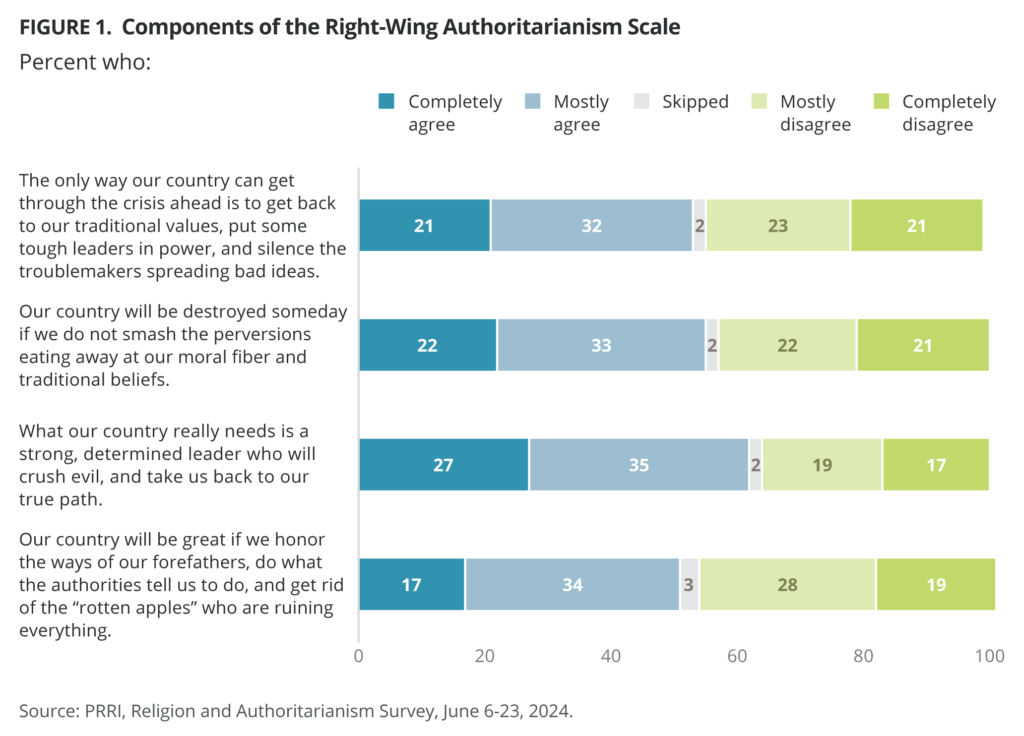
Based on their answers to these four questions, each respondent receives a composite score on the RWAS (with a standardized range of 0 to 1) and is then assigned to one of five groups:
Very high RWAS (Score 0.76–1): These Americans overwhelmingly either agree or completely agree with all four statements in the scale. This group includes 21% of Americans. 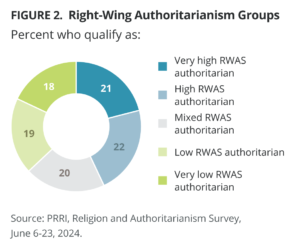
High RWAS (Score 0.60–0.75): These Americans agree with most statements in the scale, but they are less likely than those who score very high to completely agree. This group includes 22% of Americans.
Mixed RWAS (Score 0.50–0.59): These Americans show mixed opinions. This group includes 20% of Americans.[4]
Low RWAS (Score 0.25-0.49): These Americans disagree with most statements in the scale, but they are less likely than those who score very low to completely disagree. This group includes 19% of Americans.
Very low RWAS (Score 0-0.24): These Americans overwhelmingly either disagree or completely disagree with all four statements in the scale. This group includes 18% of Americans.
Child-Rearing Authoritarianism Scale
Social scientists also developed the Child-Rearing Authoritarianism Scale (CRAS), an alternative measure of authoritarianism that uses the frame of child-rearing preferences and therefore is less closely associated with conservative political ideology.[5] Respondents, for example, are asked to choose between desirable childhood traits that emphasize authority (e.g., good manners) and autonomy (e.g., curiosity).[6]
Subsequent studies show that this measure explains a range of political views and policy preferences, from opposition to democracy, racial and women’s equality, and LGBTQ rights, as well as support for political leaders and parties who oppose such efforts.[7] Yet, critics note that results produced by this approach may be impacted by racial and class bias, producing results that suggest Black Americans are more authoritarian than whites when, in fact, that may not be the case.[8]
Following the same approach PRRI first used in a 2016 national survey, this survey finds that in three of four trait pairs, Americans favor authoritarian over autonomous traits. A majority of Americans prefer children to demonstrate good manners (56%) rather than curiosity (42%), to have respect for elders (55%) rather than independence (43%), and to be well-behaved (54%) rather than creative (45%). By contrast, a majority of Americans prefer children to demonstrate self-reliance (62%) over obedience (37%).
Using these four questions, we computed a single additive scale which identifies five distinct orientations: very high CRAS authoritarian, high CRAS authoritarian, mixed, low CRAS authoritarian, and very low CRAS authoritarian.[9] A plurality of Americans (41%) score very high (18%) or high on the CRAS (23%), a significant decline from 31% and 26%, respectively, when PRRI last deployed these measures in 2016. At the other end of the spectrum, approximately one-third of Americans (35%) score low (18%) or very low on the CRAS (17%), an increase from 13% and 10%, respectively, in 2016. Finally, one in four Americans (24%) have mixed preferences, an increase of 4 percentage points since 2016 (20%).
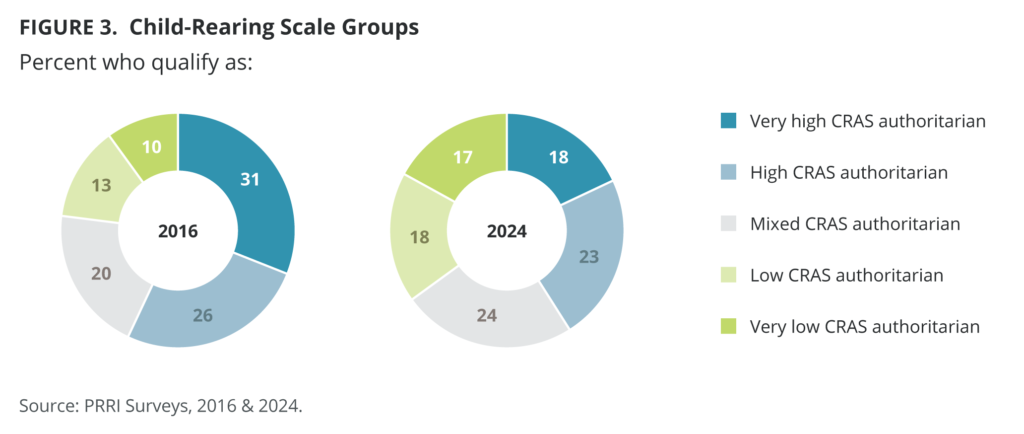
Who is More Likely to Score High on Both the Right-Wing Authoritarianism and Child-Rearing Scales?
Right-Wing Authoritarianism Scale
Americans who score high on the RWAS vary considerably by party affiliation. Two-thirds of Republicans score high (67%), including 38% who score very high, compared with over one-third of independents (35%) and 28% of Democrats. Republicans who hold favorable views of former President Donald Trump are over 36 percentage points more likely than Republicans who hold unfavorable views of Trump to score very high or high on the RWAS (75% vs. 39%). Further, nearly eight in ten Americans who most trust conservative news outlets (78%) and over two-thirds of those who most trust Fox News (68%) score very high or high on the RWAS, compared with only 43% of those who do not watch any news sources and 35% of those who most trust mainstream news.
About two-thirds of white evangelical Protestants (64%) score high or very high on the RWAS, as do slim majorities of other Protestants of color (55%), Hispanic Protestants (54%), and white Catholics (54%). A plurality of white mainline/non-evangelical Protestants (46%), Hispanic Catholics (46%), and Black Protestants (44%) score very high or high on the RWAS. Fewer than four in ten non-Christian Americans — including only 26% of religiously unaffiliated Americans, 27% of Jewish Americans, and 40% of other non-Christians — score very high or high on the RWAS.[10]
A slim majority of Americans who attend religious services at least once a week score high on the RWAS (55%), compared with 44% of those who attend services a few times a year and 38% of those who attend services seldom or never.
While there are no significant differences by race or gender, scoring high on the RWAS decreases by education level and increases with age. A slim majority of Americans who do not hold a four-year college degree (52%), compared with only 28% who have a college degree, score very high or high on the RWAS. Older Americans tend to score higher on the RWAS than younger Americans: 37% of Americans ages 18-29 and ages 30-49, 46% of Americans 50-64, and 54% of senior Americans ages 65 and over score high or very high.
Child-Rearing Authoritarianism Scale
Preferences for authoritarian traits vary considerably by party affiliation. A majority of Republicans (54%) score high on the CRAS, including one-quarter who score very high (25%). Republicans who hold favorable views of Trump are more likely than Republicans who hold unfavorable views of Trump to score very high or high on the CRAS (57% vs. 41%). Independents and Democrats are less likely to score very high or high on the CRAS (34% and 32%, respectively). However, all partisans have become significantly less likely to score very high or high on the CRAS since 2016 (69%, 55%, and 51%, respectively).
Further, majorities of Americans who most trust conservative news outlets (58%) and Fox News (53%) score very high or high on the CRAS, compared with nearly four in ten of those who do not watch any news sources (39%) or who most trust mainstream news (38%).
The majority of Black Protestants (57%), other Protestants of color (55%), and white evangelical Protestants (54%) score very high or high on the CRAS, followed by a plurality of Hispanic Catholics (45%), white Catholics (44%), Hispanic Protestants (43%), and white mainline/non-evangelical Protestants (42%). About three in ten non-Christian Americans — including only 27% of other non-Christians, 28% of religiously unaffiliated Americans, and 32% of Jewish Americans — score very high or high on the CRAS.
Half of Americans who attend religious services at least once a week score very high or high on the CRAS (51%), compared with 43% of those who attend services a few times a year and over one-third of those who attend services seldom or never (35%).
While there are no differences by gender, scores on the CRAS decrease by education level and increase with age. Almost half of Americans who have not graduated college (47%) score very high or high on the CRAS, compared with 29% of Americans who are college graduates. Older Americans tend to score very high or high on the CRAS more often than younger Americans: 34% of ages 18-29, 38% of ages 30-49, 47% of ages 50-64, and 43% of ages 65 and older score very high or high.
Consistent with the wider literature on the CRAS, this survey finds that Black Americans (53%) are the most likely to score very high or high on the CRAS, compared with 41% of Hispanic and multiracial Americans, 39% of white Americans, and 35% of Asian Americans and Pacific Islanders (AAPI).[11] However, there are differences by education. Black (56% vs. 47%), Hispanic (46% vs. 26%), and white Americans (46% vs. 26%) without a college education are significantly more likely than those with a college education to score high or very high on the CRAS.
Relationship Between Authoritarianism and Christian Nationalism
Subgroups that score high on both authoritarianism scales also tend to score high on PRRI’s Christian nationalism scale, which consists of a battery of five questions first developed for the PRRI/Brookings Christian nationalism survey in 2023.[12] In the current survey, three in ten Americans qualify as either Christian nationalism Adherents (10%) or Sympathizers (20%), compared with two-thirds who qualify as Skeptics (37%) or Rejecters (30%). White evangelical Protestants (63%), Hispanic Protestants (59%), those who attend religious services at least once a week (52%), and Republicans (52%) are the most likely to qualify as Christian nationalism Adherents or Sympathizers. Generally speaking, these groups also score high on both authoritarianism scales.
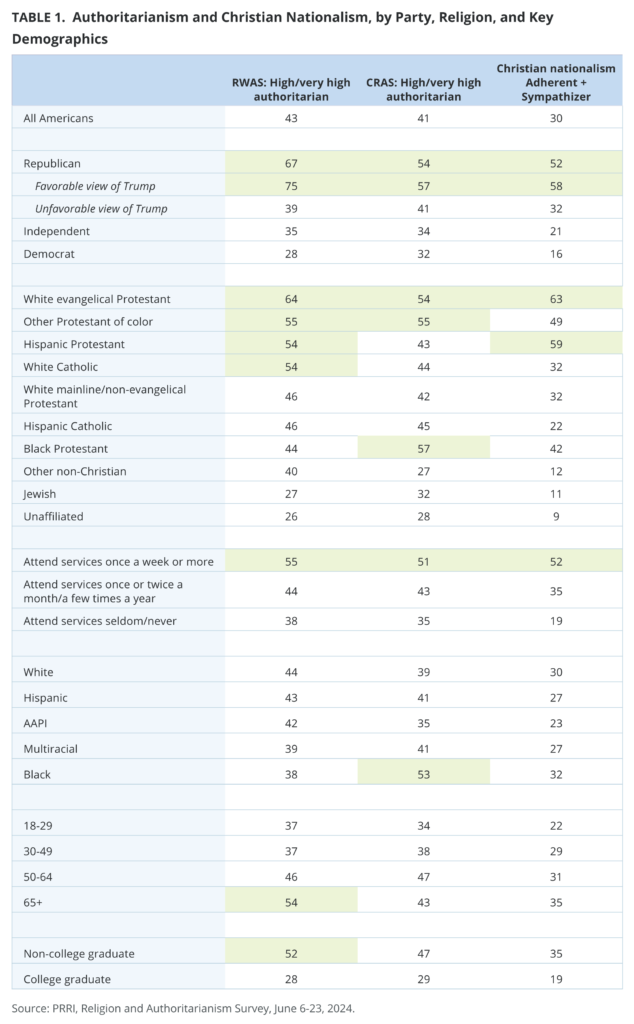
The Christian nationalism scale is positively correlated with both authoritarianism scales. Strong majorities of Christian nationalism Adherents and Sympathizers score high on both the RWAS (74%) and CRAS (61%), and more than double the rates of Christian nationalism Skeptics and Rejecters (30% and 31%, respectively.) Among those who score high on the RWAS, the majority qualify as Christian nationalism Adherents and Sympathizers (51%) or score high on the CRAS (56%). By contrast, among those who score low on the RWAS, just 7% qualify as Christian nationalism Adherents and Sympathizers and 21% score high on the CRAS. Among those who score high on the CRAS, 44% qualify as Christian nationalism Adherents and Sympathizers and 59% score high on the RWAS. By contrast, among those who score low on the CRAS, 14% qualify as Christian nationalism Adherents and Sympathizers and one-quarter score high on the CRAS (25%).
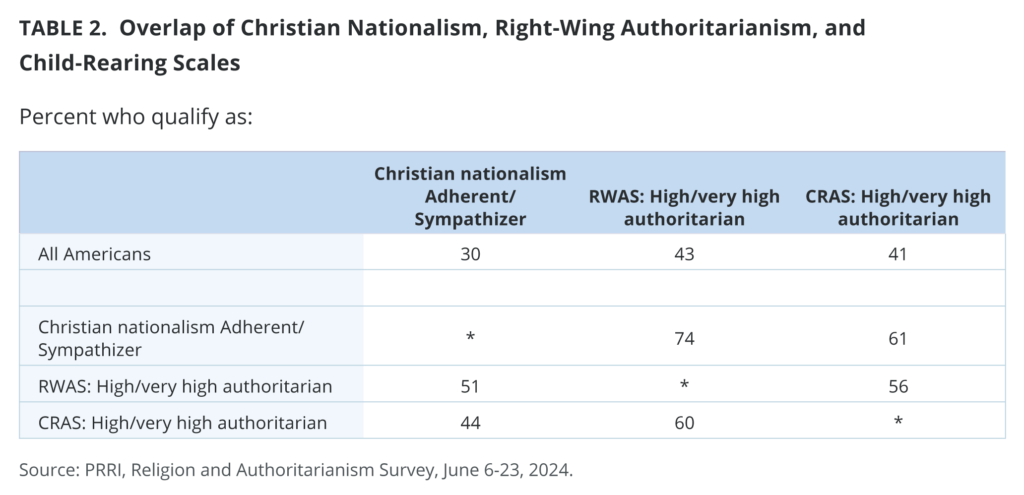
Revisiting the Jan. 6 Insurrection and Looking Ahead to the 2024 Election
The RWAS, CRAS, and Christian nationalism scale are each positively correlated with statements reflecting authoritarian perceptions of the Jan. 6 insurrection following the 2020 election, the weaponization of the Justice Department against Trump, and the idea that Trump should seize the presidency by force if he is not declared the winner of the 2024 election.
Those Convicted of Crimes on Jan. 6 Are Patriots Being Held Hostage by the Government
Only about one in four Americans agree with Trump’s frequent claim that “the people convicted for their role in the violent Jan. 6 attacks on the U.S. Capitol are really patriots who are being held hostage by the government.” Nearly three-quarters of Americans (73%) disagree, including 53% who strongly disagree.
Republicans (43%) are more than twice as likely as independents (20%) and more than six times as likely as Democrats (7%) to agree with this statement. Moreover, Republican Trump supporters are more than three times as likely as non-supporters to agree with this assessment of those convicted of crimes on Jan. 6 (51% vs. 16%).
Among religious Americans, white evangelical Protestants (41%) are the most likely to agree that those convicted for their criminal actions on Jan. 6 are patriots being held hostage by the government. Significantly smaller minorities of all other religious groups agree with this sentiment.
The authoritarianism scales are also correlated with support for the idea that those convicted of criminal activity on Jan. 6 are patriots being held hostage by the government. Nearly four in ten Americans (38%) who score very high or high on the RWAS agree, as do 28% of Americans who score very high or high on the CRAS. In contrast, just 6% of those who score very low or low on the RWAS and 16% of those who score very low or low on the CRAS agree.
Similarly, 44% of Americans who qualify as either Christian nationalism Adherents or Sympathizers agree with this idea, compared with 14% who qualify as Christian nationalism Skeptics or Rejecters.
The Department of Justice is Silencing Trump and His Supporters
Fewer than four in ten Americans (39%) agree that “the Democrats have weaponized the Department of Justice to try and silence Donald Trump and his supporters,” compared with 57% who disagree.
Republicans (78%) are more than twice as likely as independents (37%) and 10 times as likely as Democrats (8%) to agree. Republican Trump supporters are twice as likely as non-supporters to agree (88% vs. 44%).
Seven in ten white evangelical Protestants (69%) agree that Democrats are using the Department of Justice to silence Trump and his supporters. Around half of white Catholics (54%), white mainline/non-evangelical Protestants (49%), Hispanic Protestants (47%), and other Protestants of color (45%) also agree, compared with far fewer among other religious groups.
Both authoritarianism scales are highly correlated with agreement with the idea that Democrats are weaponizing the Department of Justice against Trump and his supporters. Over six in ten Americans (61%) who score very high or high on the RWAS agree, as do 50% of Americans who score high or very high on the CRAS. In contrast, notably lower percentages of those who score very low or low on the RWAS (13%) or CRAS (24%) agree.
The majority of Americans who qualify as Christian nationalism Adherents or Sympathizers (67%) agree with this idea, compared with 27% who qualify as Christian nationalism Skeptics or Rejecters.
Donald Trump Should Seize the Presidency If Not Declared the Winner of the 2024 Election
Most Americans (81%) disagree with the statement, “if Donald Trump is not confirmed as the winner of the 2024 election, he should declare the results invalid and do whatever it takes to assume his rightful place as president,” compared with 14% who agree.
Around one-quarter of Republicans (24%) agree with the statement, compared with 13% of independents and only 5% of Democrats who say the same. Republicans who hold a favorable view of Trump are more likely to agree than Republicans who hold an unfavorable view of him (29% vs. 6%).
Around two in ten white evangelical Protestants (20%) and Hispanic Catholics (18%) agree that Trump should seize the presidency if he is not declared the winner, compared with smaller minorities among other religious groups.
The RWAS and CRAS are positively correlated with agreement that Trump should take his rightful place as president if he is not confirmed as the winner. Around two in ten of those who score very high or high on the RWAS (24%) and CRAS (20%) agree, compared with just 3% and 8% of those who score very low or low on the RWAS and CRAS, respectively.
Nearly three in ten of those who qualify as Christian nationalism Adherents or Sympathizers (28%) agree, compared with 9% of those who qualify as Christian nationalism Skeptics or Rejecters.
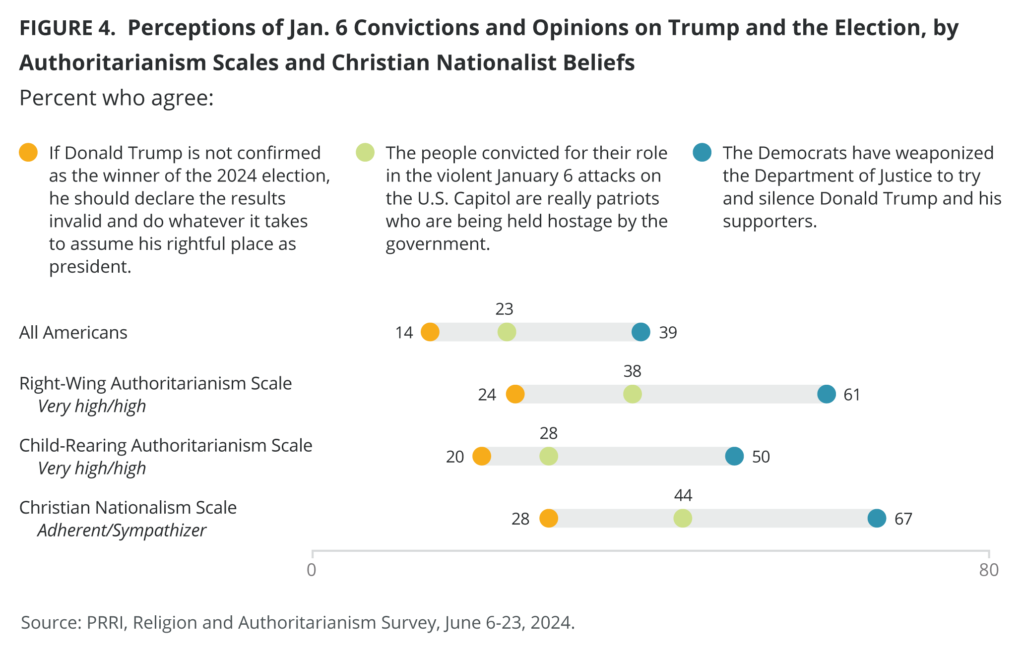
Four Measures of Authoritarian Leadership and Presidential Powers
A Strong Leader Willing to Break the Rules
Over one-third of Americans (34%) agree with the statement “Because things have gotten so far off track in this country, we need a leader who is willing to break some rules if that’s what it takes to set things right,” compared with 63% who disagree. Agreement with this statement has decreased by 11 percentage points since the first time it was asked in April 2016 (45%).
Nearly half of Republicans (49%), 32% of independents, and 22% of Democrats agree with the need for a strong leader willing to break rules to set the country right. Republican Trump supporters are more than twice as likely as non-supporters to agree (55% vs. 26%).
Among religious groups, 48% of Hispanic Protestants agree with this statement, along with 41% of Hispanic Catholics, 40% of white evangelical Protestants, 36% of white Catholics, 35% of white mainline/non-evangelical Protestants, 35% of other non-Christians, 30% of Black Protestants, 30% of other Protestants of color, 29% of unaffiliated Americans, and just 20% of Jewish Americans.
The RWAS and CRAS are also highly correlated with support for the idea that because things have gotten so far off track in this country, we need a leader who is willing to break some rules to set things right. Nearly six in ten Americans who score very high or high on the RWAS (59%) agree, compared with just 9% of those who score very low or low. Similarly, 44% of Americans who score very high or high on the CRAS agree, compared with 25% of those who score very low or low.
The majority of Americans (55%) who qualify as either Christian nationalism Adherents or Sympathizers agree with the need for a strong leader to get the country back on track, compared with 26% of those who qualify as Christian nationalism Skeptics or Rejecters.
Former Presidents Should be Immune from Criminal Prosecution
While about one-third of Americans support the need for a strong leader, there is less support for immunity from prosecution for official acts committed by a president while in office. Just one-quarter of Americans (23%) agree that “former presidents should be immune from criminal prosecution for any official actions they took while in office.”
A plurality of Republicans (44%) agree that former presidents should have immunity from prosecution for official actions conducted while in office, compared with one in ten Democrats (10%) and two in ten independents (20%) who say the same. Republicans who have a favorable view of Trump are nearly three times as likely as those who have an unfavorable view of Trump to support presidential immunity (50% vs. 19%).
Over one-third of white evangelical Protestants (35%) and white Catholics (34%), as well as three in ten or fewer white mainline/non-evangelical Protestants (30%) and Hispanic Protestants (28%), agree with this notion, compared with 21% of Jewish Americans, 19% of other Protestants of color, 16% of unaffiliated Americans, and 12% of Black Protestants.
The RWAS and CRAS are also highly correlated with agreement that former presidents should be immune from prosecution for official acts they committed as president. Over one-third of Americans (36%) who score very high or high on the RWAS agree, as do 30% of Americans who score very high or high on the CRAS. In contrast, notably lower percentages of those who score very low or low on the RWAS (9%) or CRAS (17%) agree.
Similarly, 42% of Americans who qualify as either Christian nationalism Adherents or Sympathizers agree that former presidents should have immunity from prosecution for official actions conducted while in office, compared with just 16% who qualify as Christian nationalism Skeptics or Rejecters.
Presidents Should Have the Power to Limit Opposing Parties
While very few Americans (20%) agree with the statement, “It is necessary for the progress of this country that the president has the power to limit the influence of opposing parties or groups,” Republicans (26%) are more likely than Democrats (19%) and independents (14%) to agree. Republicans who have a favorable view of Trump are more likely than those with an unfavorable view to agree (29% vs. 13%).
When examining along religious lines, similar percentages of Hispanic (37%) and Black Protestants (32%) agree that the president should have the power to limit the influence of opposing parties or groups. Roughly two in ten Hispanic Catholics (23%), white evangelical Protestants (22%), other non-Christians (22%), white mainline/non-evangelical Protestants (19%), white Catholics (17%), religiously unaffiliated Americans (17%), and other Protestants of color (16%) agree. Jewish Americans (11%) are the least likely religious group to agree with limiting the influence of opposing parties or groups.
The authoritarianism scales are also highly correlated with the idea that the president should have the power to limit the influence of opposing parties or groups. One-third of Americans (33%) who score very high or high on the RWAS agree, compared with just 8% of those who score very low or low. Similarly, 28% of Americans who score very high or high on the CRAS agree, compared with 13% of those who score very low or low.
Over one-third of Americans (35%) who qualify as either Christian nationalism Adherents or Sympathizers support the idea that the president should have the power to limit the influence of opposing parties or groups, compared with 15% who qualify as Christian nationalism Skeptics or Rejecters.
President Should Be Able to Ignore Congress or The Supreme Court
The majority of Americans (77%) disagree with the statement, “When decisions by Congress or the Supreme Court hold our country back, the president should be able to ignore them,” while only 19% of Americans agree. There are no significant differences by partisanship. About two in ten Republicans (20%), Democrats (19%), and independents (18%) agree. However, among Republicans, those who hold favorable views of Trump are more likely than those who hold an unfavorable view to agree (23% vs. 11%).
The levels of support for the president’s ability to ignore Congress or the Supreme Court varies among religious groups. Hispanic Protestants (36%), Black Protestants (30%) and Hispanic Catholics (29%) are more likely to agree with this idea than unaffiliated Americans (18%), white evangelical Protestants (17%), Jewish Americans (16%), white mainline/non-evangelical Protestants (15%), white Catholics (14%), and other Protestants of color (13%).
The RWAS and CRAS are also highly correlated with the idea that when decisions by Congress or the Supreme Court hold our country back, the president should be able to ignore them. Roughly one-quarter of Americans who score very high or high on the RWAS (27%) and CRAS (24%) agree. In contrast, around one in ten Americans who score very low or low on the RWAS (11%) and CRAS (15%) agree.
Similarly, 28% of Americans who qualify as either Christian nationalism Adherents or Sympathizers support the president ignoring Congress or the Supreme Court, compared with 16% of those who qualify as Christian nationalism Skeptics or Rejecters.
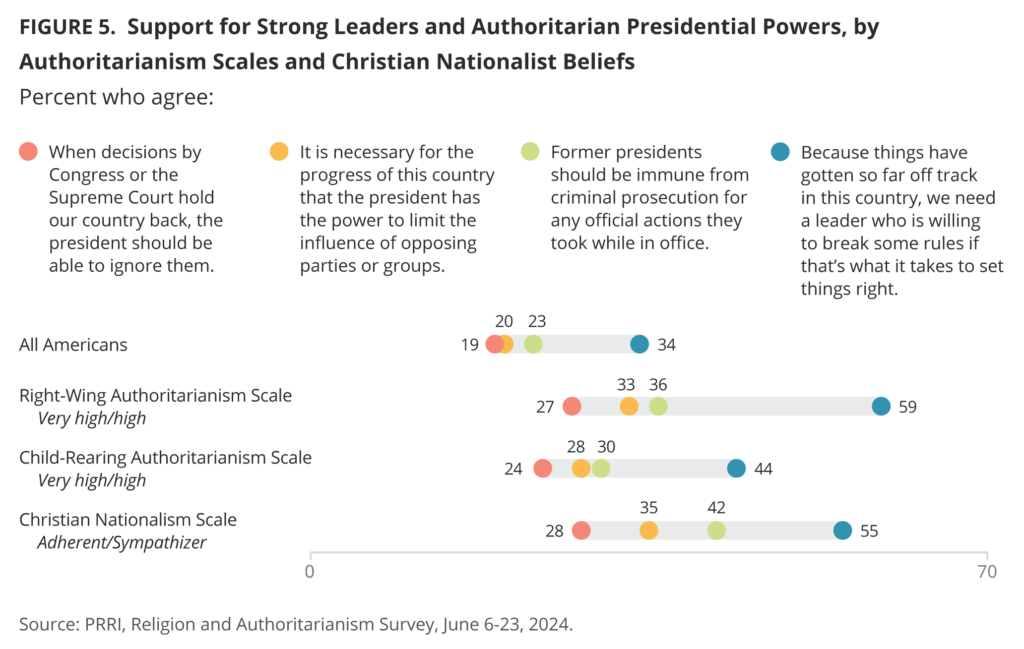
Three Measures of Support for Political Violence
Patriots May Have to Resort to Violence to Save the Country
Support for political violence has remained stable over the last three years, with a brief uptick in September 2023. Today, 16% of Americans agree that “because things have gotten so far off track, true American patriots may have to resort to violence in order to save our country,” similar to March 2021 (15%), when the question was first asked. In September 2023, agreement with this question was 23% but dropped to 19% in November 2023 and March 2024.
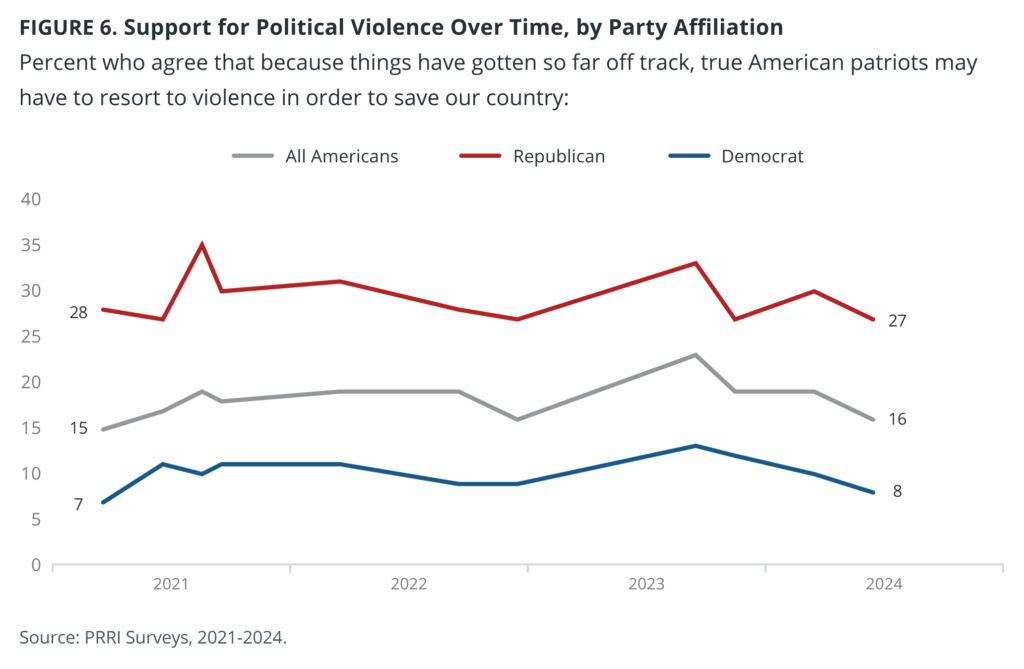
Over one-fourth of Republicans (27%) today believe that true American patriots may have to resort to violence to save the country, compared with 15% of independents and 8% of Democrats. Republicans who are Trump supporters (32%) are more likely than all Republicans (27%) and about three times as likely as Republicans who hold unfavorable views of Trump (11%) to support political violence. Americans who trust conservative news outlets are the most likely to support political violence (43%), followed by 26% of those who most trust Fox News, 18% of those who do not watch any news, and 12% of those who most trust mainstream news.
Nearly one-quarter of white evangelical Protestants (23%), along with 21% of Hispanic Protestants, 19% of other Protestants of color, 18% of other non-Christians, 17% of white mainline/non-evangelical Protestants, 16% of white Catholics, 15% of Black Protestants, 12% of Hispanic Catholics, 12% of religiously unaffiliated, and 11% of Jewish Americans, agree that true American patriots may have to resort to violence to save the country.
While there are no differences by race, support for political violence decreases as education increases: 20% of Americans who have not graduated college say political violence may be justified, compared with 9% of those who are college graduates.
Younger Americans ages 18-29 (19%) and ages 30-49 (18%) are notably more likely than older Americans ages 50-64 (14%) and senior Americans ages 65 and over (13%) to say political violence may be justified.
The authoritarianism scales are highly correlated with support for political violence. Americans who score very high or high on the RWAS are seven times as likely to support political violence, compared with those Americans who score very low or low on the RWAS (28% vs. 4%, respectively). Similarly, two in ten Americans who score very high or high on the CRAS (21%) agree, compared with 12% who score very low or low.
One-third of Americans who qualify as Christian nationalism Adherents and Sympathizers (33%) also agree that true American patriots may have to resort to violence to save the country, compared with one in ten of those who qualify as Christian nationalism Skeptics or Rejecters (10%).
Ensuring the Rightful Leader Takes Office, Even if Violence is Required
While most Americans (79%) disagree with the idea that “if the 2024 presidential election is compromised by voter fraud, everyday Americans will need to ensure the rightful leader takes office, even if it requires taking violent actions,” 16% of Americans agree.
Republicans (24%) are more likely than independents (15%) or Democrats (10%) to agree. Among Republicans, those who hold a favorable view of Trump are more likely than those who hold an unfavorable view to agree (27% vs. 11%). Over one-third of Americans who most trust conservative news outlets (35%) agree with the idea that a rightful leader is needed even if violent actions are required, compared with 23% of those who trust most Fox News, 17% of those who don’t watch any TV news, and 13% of those who trust most mainstream news outlets.
About two in ten Hispanic Protestants (24%), Hispanic Catholics (20%), white evangelical Protestants (18%), other Protestants of color (18%), and white Catholics (17%) agree that the rightful leader is needed even if violent actions are required, compared with roughly one in ten white mainline/non-evangelical Protestants (15%), unaffiliated (14%), and Black Protestants (11%). Jewish Americans are half as likely as other non-Christians to agree (13% vs. 28%).
The RWAS and CRAS are also highly correlated with agreement that the rightful leader is needed even if violent actions are required to secure this leader. About one-quarter of Americans (26%) who score very high or high on the RWAS agree, as do 20% of Americans who score very high or high on the CRAS. In contrast, roughly one in ten of Americans who score very low or low on the RWAS (6%) or CRAS (11%) agree.
Three in ten Americans who qualify as either Christian nationalism Adherents or Sympathizers (30%) support the need for the rightful leader even if violent actions are required, compared with 12% of those who qualify as Christian nationalism Skeptics or Rejecters.
Armed Citizens Are Needed as Poll Watchers to Ensure a Fair Election
Just 15% of Americans agree with the idea that “to ensure a fair vote for the presidential election this November, we need armed everyday citizens to show up as poll watchers, even if this makes some voters uncomfortable.”
Nearly one-quarter of Republicans (24%) and one in ten independents and Democrats (both 10%) agree with the statement. Republican Trump supporters are twice as likely as non-supporters to agree (28% vs. 14%). About one in four Americans who most trust conservative news outlets (28%) and Fox News (25%) also agree that armed citizens are needed to ensure a fair election in November, compared with 14% of those who do not watch TV news or most trust mainstream media outlets (13%).
About two in ten other non-Christians (23%), other Protestants of color (21%), Hispanic Protestants (20%), white evangelical Protestants (19%), Hispanic Catholics (18%), and white Catholics (17%) agree with the idea that armed citizens are needed to ensure a fair election in November, compared with about one in ten white mainline/non-evangelical Protestants (14%), Black Protestants (12%), unaffiliated (11%), and Jewish Americans (10%).
While there are no differences by race on this measure, education emerges as a significant factor: 18% of Americans who have not graduated college agree that armed citizens are needed to ensure a fair election in November, compared with just 8% of college-educated Americans.
The authoritarianism scales are also highly correlated with the idea that armed citizens are needed to ensure a fair election in November. One-quarter of Americans (25%) who score very high or high on the RWAS agree, compared with just 4% of those who score very low or low. Similarly, two in ten Americans who score very high or high on the CRAS (20%) agree, compared with one in ten who score very low or low (9%).
Nearly three in ten Americans who qualify as either Christian nationalism Adherents or Sympathizers (29%) agree with this idea, compared with one in ten who qualify as Christian nationalism Skeptics or Rejecters (9%).
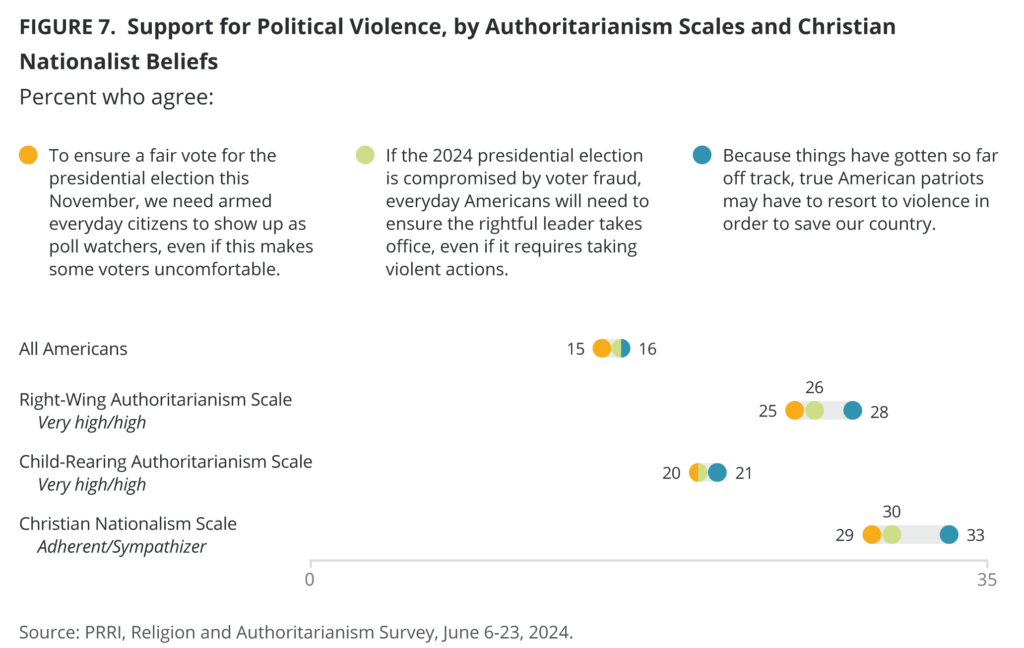
Three Measures of Christian Nationalist Theology
A Final Battle Between Good and Evil is Upon Us
A plurality of Americans (45%) agrees with the statement, “The final battle between good and evil is upon us, and Christians should stand firm with the full armor of God,” compared with about half (52%) who disagree.
Republicans (65%) are notably more likely than independents (39%) and Democrats (32%) to agree. Among Republicans, those with favorable views of Trump are more likely than those with unfavorable views to agree (70% vs. 47%, respectively). Around three-fourths of Americans who most trust conservative news sources (76%) and nearly seven in ten of those who most trust Fox News (69%) agree with this idea, compared with 44% who do not watch TV news and 37% who most trust mainstream news.
Around three in four white evangelical Protestants (78%), Hispanic Protestants (75%), Black Protestants (73%), and two-thirds of other Protestants of color (65%) agree that the final battle between good and evil is upon us, and Christians should stand firm with the full armor of God. Fewer than half of Hispanic Catholics (49%), white mainline/non-evangelical Protestants (46%), and white Catholics (46%) agree with this concept. One-quarter (24%) of other non-Christians, 20% of religiously unaffiliated Americans, and 16% of Jewish Americans are the least likely to agree with the statement.
More than half of Americans without a four-year degree (52%) agree with this concept, compared with 31% with a four-year degree or higher. By contrast, older Americans (50% who are ages 65 or older and 48% who are ages 50-64) are more likely than younger Americans (42% who are ages 30-49 and 40% who are ages 18-29) to agree.
The RWAS and CRAS are also highly correlated with the idea that the final battle between good and evil is upon us, and Christians should stand firm with the full armor of God. Seven in ten Americans who score very high or high on the RWAS (70%) agree, as do 61% of Americans who score very high or high on the CRAS. In contrast, smaller percentages of Americans who score very low or low on the RWAS (16%) or CRAS (27%) agree.
The vast majority of Christian nationalism Adherents or Sympathizers — 84% — agree that the final battle between good and evil is upon us, and Christians should stand firm with the full armor of God, compared with just 28% of those who qualify as Christian nationalism Skeptics or Rejecters.
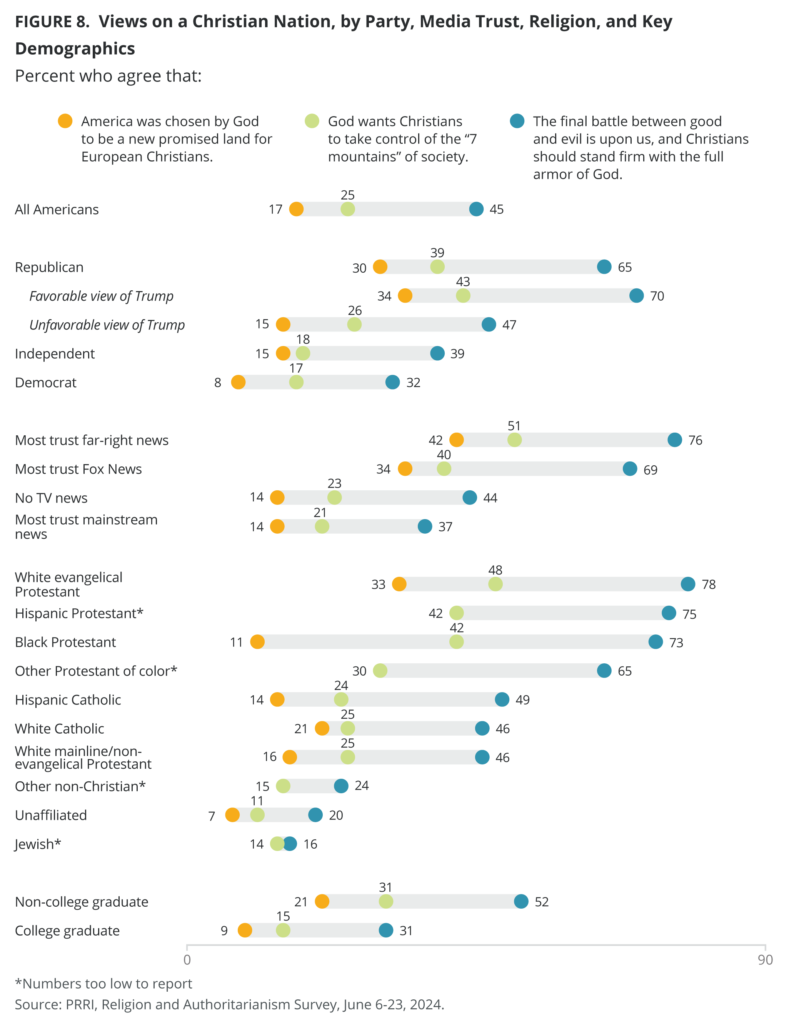
God Wants Christians Taking Control of the “7 Mountains” of Society
One in four of Americans (25%) agree that God wants Christians to take control of the “7 mountains” of society, including the government, education, media, and others. Most Americans (70%) disagree with this sentiment.
Republicans (39%) are more likely than independents (18%) and Democrats (17%) to agree. Similarly, Republicans who hold a favorable view of Trump are more likely than those who hold an unfavorable view to agree (43% vs. 26%). Around half of Americans who most trust conservative news (51%) also agree that God wants Christians to take control of the “7 mountains” of society, followed by 40% of those who most trust Fox News, 23% who do not watch TV news, and 21% who most trust mainstream news.
Nearly half of white evangelical Protestants (48%) agree that God wants Christians to take control of the “7 mountains” of society, followed by around four in ten Black Protestants (42%) and Hispanic Protestants (42%). Three in ten other Protestants of color (30%) and around one-quarter of white mainline/non-evangelical Protestants (25%), white Catholics (25%), and Hispanic Catholics (24%) also agree. Far fewer other non-Christians (15%), Jewish Americans (14%), and religiously unaffiliated Americans (11%) agree with this idea.
Nearly one-third of those without a four-year college degree agree that God wants Christians to take control of the “7 mountains” of society (31%) compared with 15% of those with a four-year degree or higher. Older Americans (27% of those ages 50-64 and 28% of those ages 65 and older) are also slightly more likely than younger Americans (22% of those ages 18-29 and 23% of those ages 30-49) to agree.
The RWAS and CRAS are also correlated with the idea that God wants Christians to take control of the “7 mountains” of society. A plurality of Americans (43%) who score very high or high on the RWAS agree, as do 35% of Americans who score very high or high on the CRAS. In contrast, roughly one in ten Americans who score very low or low on the RWAS (6%) or CRAS (14%) agree.
Nearly six in ten Americans who qualify as either Christian nationalism Adherents or Sympathizers (57%) agree with this idea, compared with one in ten Americans who qualify as Christian nationalism Skeptics or Rejecters (11%).
America was Chosen by God to be a New Promised Land for European Christians
Less than one in five Americans (17%) agree that “America was chosen by God to be a new promised land for European Christians,” while 76% disagree.
Republicans (30%) are more likely than independents (15%) and Democrats (8%) to agree. Republicans who hold favorable views of Trump are also more likely than those who hold unfavorable views to agree (34% vs. 15%). Further, the share of Americans who most trust conservative news (42%) and Fox News (34%) and agree with this statement is notably higher than Americans who most trust mainstream news (14%) or who do not watch TV news (14%).
One-third of white evangelical Protestants (33%) agree that America was chosen by God to be a new promised land for Europeans. Far fewer white Catholics (21%), white mainline/non-evangelical Protestants (16%), Hispanic Catholics (14%), and Black Protestants (11%) agree. Religiously unaffiliated Americans are the least likely to agree (7%).[13]
Americans without a four-year degree (21%) are twice as likely as those with a four-year degree or higher (9%) to agree that American was divinely chosen to be a promised land for European Christians.
The authoritarianism scales are also highly correlated with the statement that America was chosen by God to be a new promised land for European Christians. Nearly three in ten Americans (28%) who score very high or high on the RWAS agree, as do 23% of Americans who score very high or high on the CRAS. In contrast, under one in ten Americans who score very low or low on the RWAS (5%) or CRAS (9%) agree.
Similarly, 41% of Americans who qualify as either Christian nationalism Adherents or Sympathizers agree with this statement, compared with just 7% of those who qualify as Christian nationalism Skeptics or Rejecters.
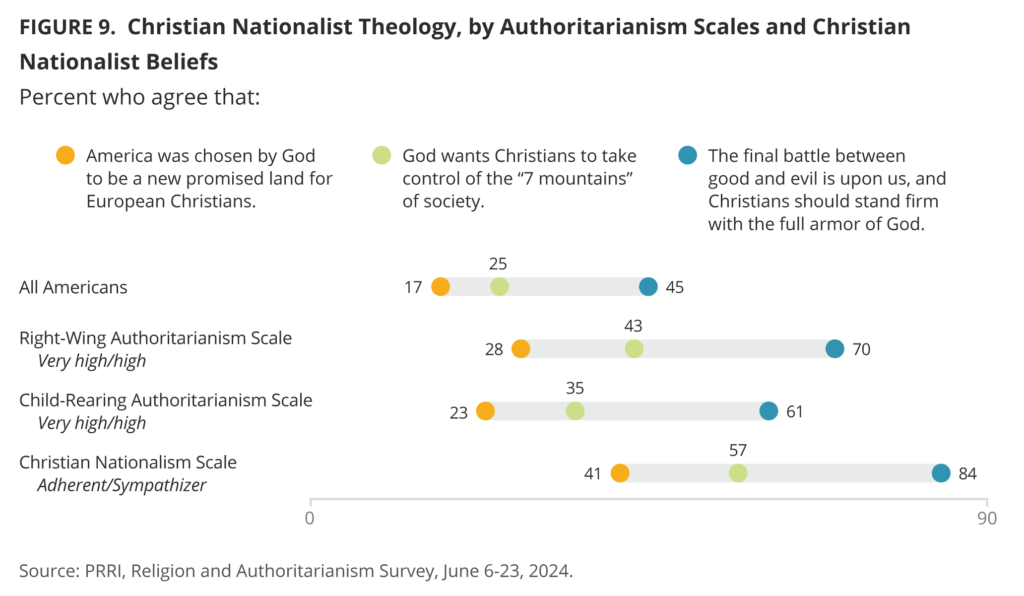
Protecting American Culture and Fighting for Values
America is in Danger of Losing its Culture and Identity
A majority of Americans (56%) agree that America is in danger of losing its culture and identity, compared with 42% who disagree. This number has not significantly changed since the question was first asked in 2016.
Eight in ten Republicans agree with this statement (80%), along with 54% of independents and 38% of Democrats. Among Republicans, those who favor Trump (86%) are more likely than those who oppose him (60%) to agree. The vast majority of those who most trust Fox News (84%) and other conservative news channels (89%) agree that America is in danger of losing its culture and identity, compared with 56% of those who do not watch TV news and nearly half of those who most trust mainstream news channels (48%).
White evangelical Protestants (77%) and white Catholics (68%) are the most likely religious groups to agree that America is in danger of losing its culture and identity. Additionally, about six in ten white mainline/non-evangelical Protestants (62%), Hispanic Protestants (62%), Black Protestants (57%), and other Protestants of color (57%) agree. About half of Hispanic Catholics (55%) and Jewish Americans (52%) share this sentiment. Religiously unaffiliated Americans (41%) and other non-Christians (39%) are the least likely to agree.
At least six in ten Americans ages 65 or over (65%) or between ages 50-64 (60%) agree that America is in danger of losing its culture and identity, compared with about half of younger Americans ages 30-49 (50%) and 18-29 (48%).
The RWAS and CRAS are also highly correlated with the idea America is in danger of losing its culture and identity. The majority of Americans who score very high or high on the RWAS (82%) and CRAS (69%) agree with this idea, compared with one-quarter of those who score very low or low on the RWAS (24%) and 39% of those who score very low or low on the CRAS.
The vast majority of Christian nationalism Adherents and Sympathizers agree that America is in danger of losing its culture and identity (82%), compared with a plurality of those who qualify as Christian nationalism Skeptics or Rejecters (44%).
Important to Fight Against Laws and Cultural Changes that Conflict with My Values
A plurality of Americans (43%) agrees with the statement, “It is important to keep fighting against laws and cultural changes that conflict with my values, even if most other Americans disagree,” compared with 53% who disagree. Agreement with this statement has decreased by 14 percentage points from 57% since the question was first asked in 2016.
Republicans (57%) are more likely than independents (41%) and Democrats (32%) to agree. Among Republicans, those who favor Trump (59%) are more likely to agree than those who hold unfavorable views (48%). Further, those who most trust Fox News (59%) or other conservative news channels (67%) are more likely than those who do not watch TV news (47%) and those who most trust mainstream news channels (35%) to agree with importance of continuing to fight against laws that conflict with their values.
Majorities of white evangelical Protestants (61%), Hispanic Protestants (56%), and Black Protestants (54%) agree that it is important to keep fighting against laws and cultural changes if they conflict with their values, even if most other Americans disagree. Fewer other Protestants of color (49%), white Catholics (43%), other non-Christians (41%), white mainline/non-evangelical Protestants (39%), and Hispanic Catholics (39%) agree. The religious groups that are least likely to agree with this statement are the unaffiliated (35%) and Jewish Americans (31%).
The RWAS and CRAS are also highly correlated with the idea that it is important to keep fighting against laws and cultural changes if they conflict with personal values. Nearly six in ten Americans who score very high or high on the RWAS (59%) agree, as do 49% of Americans who score very high or high on the CRAS. In contrast, notably lower percentages of those who score very low or low on the RWAS (27%) or CRAS (37%) agree.
Similarly, two-thirds of Americans who qualify as Christian nationalism Adherents or Sympathizers (64%) agree that is important to keep fighting against laws and cultural changes if they conflict with their values, even if most other Americans disagree, compared with over one-third of those who qualify as Christian nationalism Skeptics or Rejecters (36%).
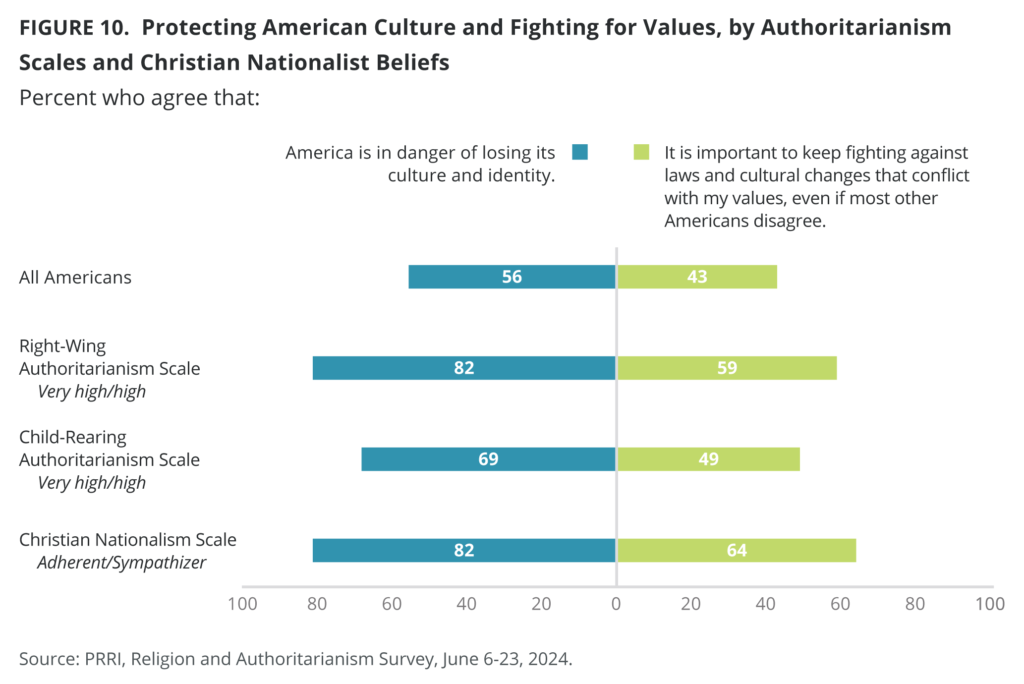
The Role of Patriarchy in Society
The Husband as the Head of the Household in a Christian Family
About one-third of Americans (32%) agree with the statement, “In a truly Christian family, the husband is the head of the household and his wife submits to his leadership,” while 65% disagree.
Republicans are twice as likely as Democrats to agree with this statement (45% vs. 22%), while 29% of independents agree. Among Republicans, those who hold favorable views of Trump are more likely than those who hold unfavorable views to agree (49% vs. 35%).
Majorities of white evangelical Protestants (61%), Black Protestants (61%), other Protestants of color (59%), and Hispanic Protestants (51%) agree with this statement. Fewer than three in ten in other religious groups agree: Hispanic Catholics (27%), other non-Christians (25%), and about two in ten white mainline/non-evangelical Protestants (22%), white Catholics (21%), religiously unaffiliated (19%), and Jewish Americans (17%).
The authoritarianism scales are also correlated with agreement that in a truly Christian family the husband is the head of the household and his wife submits to his leadership. Four in ten Americans who score very high or high on the RWAS (45%) and Americans who score very high or high on the CRAS (41%) agree, compared with around two in ten who score very low or low on the RWAS (18%) and CRAS (22%).
Higher percentages of Americans who qualify as either Christian nationalism Adherents or Sympathizers (58%) agree that in a Christian family the husband is the head of the household, while 21% who qualify as Christian nationalism Rejecters or Sympathizers say the same.
Society Has Become Too Soft and Feminine
About four in ten Americans (41%) agree that society as a whole has become too soft and feminine, while a majority disagree (56%). Agreement with this statement has not changed significantly since the question was first asked in 2011.
Nearly seven in ten Republicans (68%) agree with this idea, and they are significantly more likely to do so than independents (40%) and Democrats (20%). Republicans who favor Trump are more likely than those with unfavorable views to agree (73% vs. 47%).
Majorities of white evangelical Protestants (61%) and other Protestants of color (58%) agree that society has become too soft and feminine, along with about half of Hispanic Protestants (49%), white Catholics (48%), white mainline/non-evangelical Protestants (47%), and Black Protestants (46%). Fewer other non-Christians (40%), Hispanic Catholics (35%), Jewish Americans (35%), and the unaffiliated (30%) share this sentiment.
The RWAS and CRAS are also highly correlated with agreement that society has become too soft and feminine. Six in ten Americans who score very high or high on the RWAS (61%) agree, while less than two in ten who score very low or low (17%) say the same. About half of Americans who score very high or high on the CRAS (52%) agree, compared with 28% who score very low or low.
Americans who qualify as Christian nationalism Adherents or Sympathizers are more likely than those who qualify as Christian nationalism Skeptics or Rejecters to agree that society has become too soft and feminine (66% vs. 31%).
Men and Women Being Naturally Suited for Certain Jobs
About one-third of Americans (32%) agree with the statement, “Society is better off when men and women stick to the jobs and tasks they are naturally suited for,” while two-thirds (65%) disagree. Americans are 7 percentage points less likely to agree with this statement than they were when the question was first asked in 2016 (39%).
Republicans (45%) are significantly more likely than independents (30%) and Democrats (23%) to agree that men and women should stick to the jobs they are naturally suited for. Republicans who favor Trump are more likely than Republicans who hold unfavorable views to share this sentiment (48% vs. 35%).
Among religious groups, white evangelical Protestants (46%) and Hispanic Catholics (39%) are the most likely to agree that men and women should stick to the jobs they are naturally suited for. About one-third of Black Protestants (36%) and white Catholics (34%) agree with this statement; white mainline/non-evangelical Protestants (26%) and religiously unaffiliated Americans (22%) are the least likely to agree.[14]
The RWAS and CRAS are also correlated with agreement that society is better off when men and women stick to the jobs they are naturally suited for. Under half of Americans who score very high or high on the RWAS (48%) agree, compared with 15% who score very low or low. Around four in ten who score very high or high on the CRAS agree (42%), while 24% who score very low or low say the same.
Americans who qualify as Christian nationalism Adherents or Sympathizers are more likely than those who qualify as Christian nationalism Skeptics or Rejecters to agree that society is better off when men and women stick to the jobs they are naturally suited for (56% vs. 22%).
A Woman’s Vocation as a Wife and Mother
One-quarter of Americans (25%) agree with the statement, “The truest vocation that any woman can attain in this life is to be a wife and mother,” while 72% disagree.
Republicans (41%) are more likely than independents (24%) and Democrats (13%) to agree. Among Republicans, those who hold favorable views of Trump are more likely than those with unfavorable views to agree (44% vs. 31%).
About half of white evangelical Protestants (49%) agree that a woman’s truest vocation is that of wife and mother, followed by Black Protestants (29%), white Catholics (24%), other non-Christians (22%), white mainline/non-evangelical Protestants (22%), Hispanic Catholics (19%), and 15% of religiously unaffiliated Americans.[15]
The authoritarianism scales also correlate with agreement that the truest vocation any woman can attain in this life is to be a wife and mother. Four in ten Americans who score very high or high on the RWAS (40%) agree, while only 7% of those who score very low or low agree. Americans who score very high or high on the CRAS are more likely than those who score very low or low to agree (32% vs. 15%).
Similarly, 45% of Americans who qualify as either Christian nationalism Adherents or Sympathizers agree with this idea, compared with 16% of those who qualify as Christian nationalism Skeptics or Rejecters.
Women’s Gains at the Expense of Men
About two in ten Americans (17%) agree that the gains women have made in recent years have come at the expense of men, while about eight in ten (79%) disagree. This number has not changed since the question was first asked in 2017.
About a quarter of Republicans (27%) agree with this statement, and they are notably more likely to do so than independents (18%) and Democrats (10%). Republicans who favor Trump are also more likely than Republicans who hold unfavorable views to agree (29% vs. 23%).
About a quarter of other Protestants of color (27%) and white evangelical Protestants (24%) agree that women’s gains have come at the expense of men. About two in ten Hispanic Catholics (21%), other non-Christians (21%), Hispanic Protestants (19%), white Catholics (18%), and Black Protestants (16%) also agree. Fifteen percent of religiously unaffiliated Americans, 14% of white mainline/non-evangelical Protestants, and 10% of Jewish Americans also agree.
The RWAS and CRAS are also correlated with the idea that the gains women have made in recent years have come at the expense of men. Roughly one-quarter of Americans who score very high or high on the RWAS (27%) and the CRAS (23%) agree, compared with around one in ten who score very low or low on the RWAS (8%) and the CRAS (11%).
Similarly, 31% of Americans who qualify as either Christian nationalism Adherents or Sympathizers agree that the gains of women have made in recent years have come at the expense of men, while 12% who qualify as Christian nationalism Skeptics or Rejecters say the same.
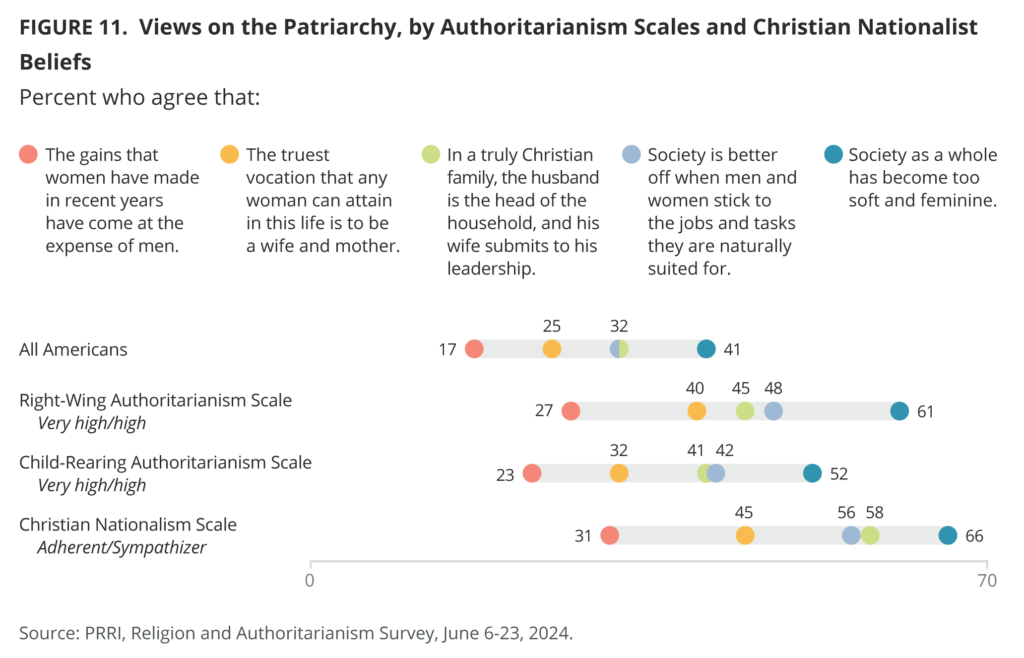
The Impact of Immigrants on the Economy and Local Communities
Immigrants are Good for the Economy
Nearly two-thirds of Americans (65%) say that immigrants are generally good for America’s economy, while less than one-third (32%) disagree with this statement.
More than eight in ten Democrats (83%) agree that immigrants are good for the economy, compared with 70% of independents and 43% of Republicans. Republicans with favorable views of Donald Trump are less likely than those with unfavorable views to agree (37% vs. 62%).
Except for white evangelical Protestants (49%), the majority of each religious tradition agree that immigrants are generally good for America’s economy. Around three-fourths of Jewish Americans (74%), other non-Christians (74%), religiously unaffiliated (74%), Hispanic Catholics (74%), and Black Protestants (73%) agree with this view of immigrants. Two-thirds of Hispanic Protestants (65%) and smaller majorities of white Catholics (58%), other Protestants of color (57%), and white mainline/non-evangelical Protestants (55%) also agree.
Americans who score very high or high on the RWAS (50%) and CRAS (53%) are less likely than those who score very low or low on those scales (83% and 80%, respectively) to agree that immigrants are generally good for America’s economy.
Three-fourths of Americans who qualify as Christian nationalism Skeptics or Rejecters (75%) agree that immigrants are generally good for America’s economy, compared with less than half of those who qualify as Christian nationalism Adherents or Sympathizers (47%).
Growing Number of Newcomers from Other Countries Burden Local Communities
The majority of Americans agree with statement, “The growing number of newcomers from other countries burdens local communities by using more than their share of social services” (56%), compared with 40% who disagree.
The vast majority of Republicans (84%) agree that newcomers from other countries burden local communities, compared with 54% of independents and only one-third of Democrats (35%) who say the same. Republicans who hold favorable views of Trump are more likely than Republicans who hold unfavorable views to agree with the statement (88% vs. 74%). Nearly all Americans who most trust conservative news sources (94%) and eight in ten who most trust Fox News (85%) agree that the growing number of newcomers burdens local communities. However, only around half of those who do not watch TV news (53%) and those who most trust mainstream news (48%) say the same.
Three-quarters of white evangelical Protestants (75%) and white Catholics (73%) and around two thirds of white mainline/non-evangelical Protestants (66%) and other Protestants of color (65%) agree with this statement. Smaller majorities of Hispanic Protestants (58%), Black Protestants (53%), and Jewish Americans (53%) agree. Less than half of Hispanic Catholics (47%), other non-Christians (45%), and religiously unaffiliated Americans (40%) agree.
The RWAS and CRAS are also highly correlated with agreement that the growing number of newcomers from other countries burdens local communities. Nearly eight in ten Americans who score very high or high on the RWAS (77%) agree, compared with 30% of those who score very low or low. Americans who score very high or high on the CRAS are more likely than those who score very low or low to agree that newcomers burden local communities (68% vs. 40%).
Similarly, 79% of Americans who qualify as either Christian nationalism Adherents or Sympathizers agree that the growing number of newcomers from other countries burdens local communities, while 47% of Christian nationalism Skeptics or Rejecters agree.
Immigrants Increase Crime Rates in Local Communities
Nearly four in ten Americans (38%) of Americans agree with the statement, “Immigrants increase crime rates in local communities.” Nearly six in ten Americans (59%) disagree with this statement.
Two-thirds (67%) of Republicans agree with this statement, compared with 35% of independents and 17% of Democrats. Republicans who hold favorable views of Trump are more likely than those who hold unfavorable views to agree (75% vs 37%). More than eight in ten Americans who most trust conservative news (82%) and 70% of those who trust Fox News agree with this statement, compared with 37% of those who do not watch TV news and 28% of those who most trust mainstream news.
Majorities of white evangelical Protestants (58%) and white Catholics (51%) agree that immigrants increase crime rates in local communities. Fewer than half of white mainline/non-evangelical Protestants (46%), other Protestants of color (43%), Hispanic Protestants (41%), Jewish Americans (38%), other non-Christians (33%), Hispanic Catholics (30%), Black Protestants (26%) and religiously unaffiliated Americans (26%) agree.
The authoritarianism scales are also highly correlated with agreement that immigrants increase crime rates in local communities. Six in ten Americans who score very high or high on the RWAS (59%) agree, as do half of Americans who score very high or high on the CRAS (50%). Around one in ten Americans who score very low or low on the RWAS (14%) and one-quarter who score very low or low on the CRAS (24%) agree.
Similarly, around two-thirds of Americans who qualify as either Christian nationalism Adherents or Sympathizers (63%) agree that immigrants increase crime rates in local communities, while less than three in ten who qualify as Christian nationalism Skeptics or Rejecters (28%) say the same.
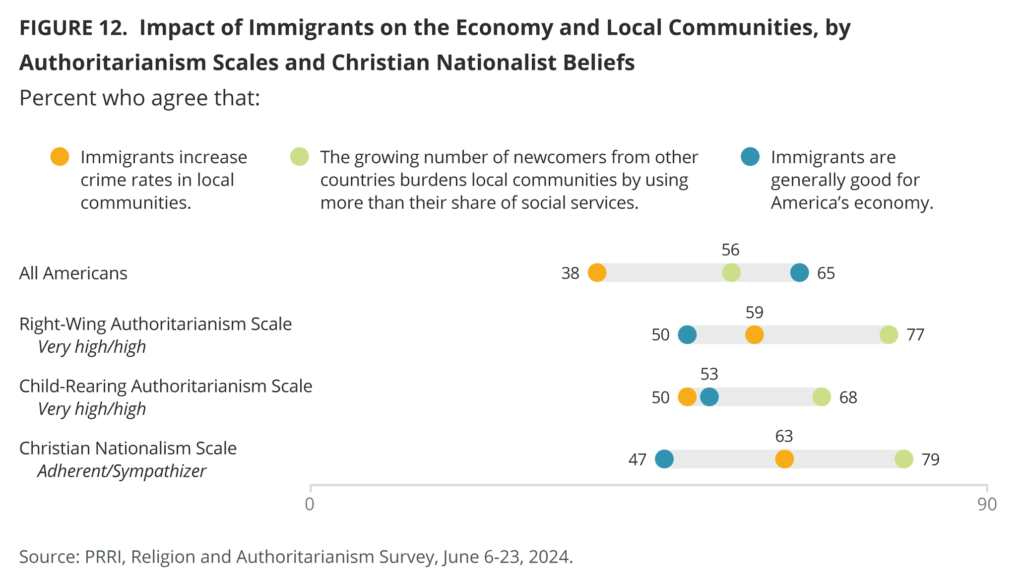
Extremist Views About Immigrants
Immigrants are Invading our Country and Replacing our Cultural and Ethnic Background
One-third of Americans (33%) agree with the “Great Replacement Theory,” or the idea that immigrants are invading our country and replacing our cultural and ethnic background. The majority of Americans (62%) disagree with this theory. Agreement with this theory has decreased by 3 percentage points from 36% in 2019.
Six in ten Republicans (60%) agree with the “Great Replacement Theory,” compared with 30% of independents and 14% of Democrats. Among Republicans, those who hold a favorable view of Trump are more likely than those who hold an unfavorable view to agree that immigrants are invading our country (68% vs. 32%). More than eight in ten Americans who most trust conservative news (81%) and nearly seven in ten of those who most trust Fox News (68%) agree, followed by 33% of those who do not watch TV news and 23% who most trust mainstream news.
White evangelical Protestants are the only religious group in which a majority agree with the “Great Replacement Theory” (55%). Around four in ten white Catholics (45%), white mainline/non-evangelical Protestants (44%), and other Protestants of color (40%) agree with the theory. Fewer than one-third of Hispanic Protestants (32%), 22% of Hispanic Catholics, and 21% of Black Protestants agree. Among non-Christian groups, 31% of Jewish Americans, 24% of religiously unaffiliated Americans, and 22% of other non-Christians agree that immigrants are invading our country.
The RWAS and CRAS are also highly correlated with agreement with the “Great Replacement Theory”. Over half of Americans who score very high or high on the RWAS (56%) and under half of Americans who score very high or high on the CRAS (47%) agree, compared with notably lower percentages of those who score very low or low on the RWAS (10%) and CRAS (19%).
Two-thirds of Americans who qualify as either Christian nationalism Adherents or Sympathizers (65%) agree with the “Great Replacement Theory.” Two in ten Americans who qualify as Christian nationalism Skeptics or Rejecters (21%) also agree.
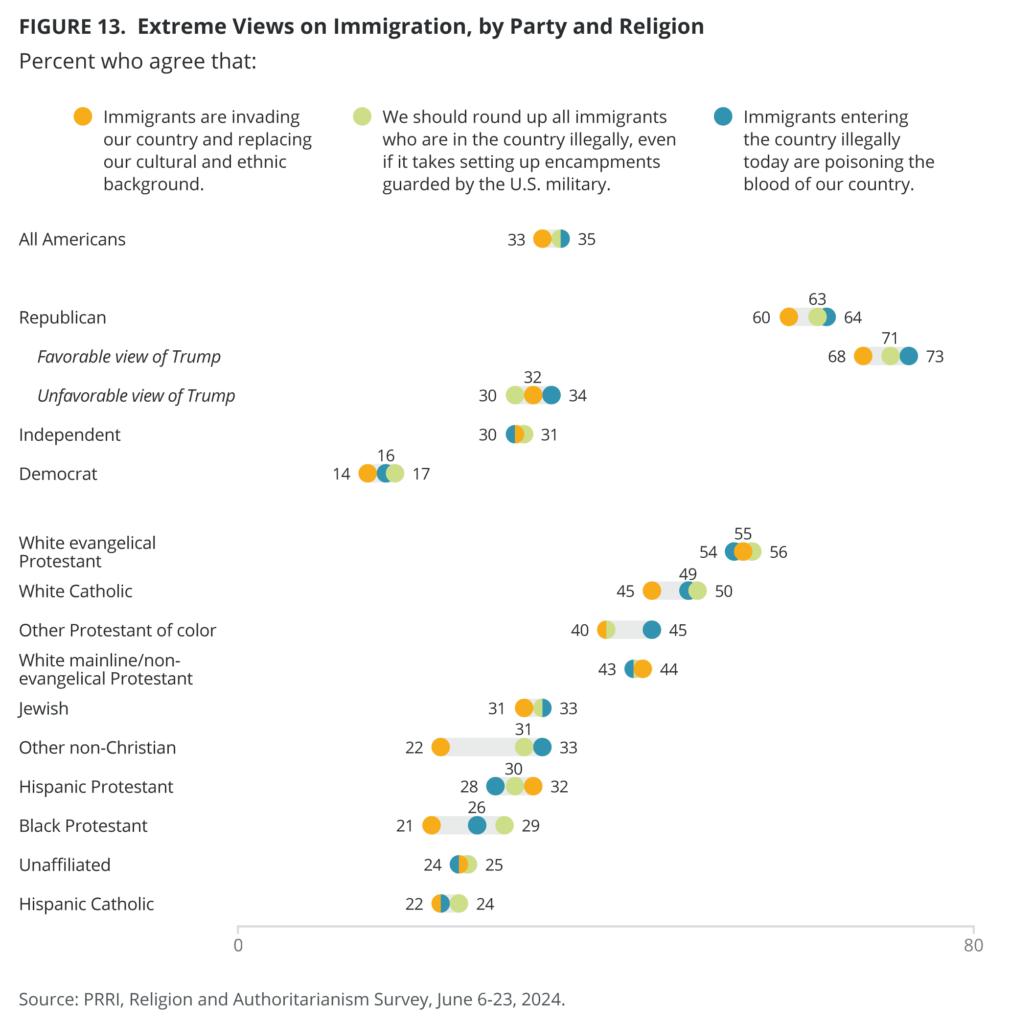
Immigrants Entering the Country Illegally are Poisoning the Blood of Our Country
Around one-third of Americans (35%) agree that the immigrants entering the country illegally today are poisoning the blood of our country, while the majority of Americans (62%) disagree.
Republicans (64%) are twice as likely as independents (30%) and four times as likely as Democrats (16%) to agree that illegal immigrants are poisoning the blood of our country. Among Republicans, those who favor Trump are more likely than those who do not favor him to agree with the statement (73% vs. 34%). Nearly eight in ten Americans who most trust conservative media (78%) agree, followed by 67% of those who most trust Fox News, 35% who do not watch TV news, and 24% who most trust mainstream news.
The majority of white evangelical Protestants (54%) agree that immigrants are poisoning the blood of our country, followed by 49% of white Catholics, 45% of other Protestants of color, and 43% of white mainline/non-evangelical Protestants. Fewer Jewish Americans (33%), other non-Christians (33%), Hispanic Protestants (28%), Black Protestants (26%), religiously unaffiliated Americans (24%), and Hispanic Catholics (22%) agree.
The RWAS and CRAS are also highly correlated with agreement that illegal immigrants are poisoning the blood of our country. Six in ten Americans who score very high or high on the RWAS (59%) agree, compared with only 9% of Americans who score very low or low. Americans who score very high or high on the CRAS are more likely than those who score very low or low to agree that illegal immigrants are poisoning the blood of our country (48% vs. 21%).
Two-thirds of Americans who qualify as either Christian nationalism Adherents or Sympathizers (64%) agree with this statement, while 23% of Christian nationalism Skeptics or Rejecters say the same.
Immigrants Should be Rounded Up and Put into Encampments Guarded by the Military
More than one-third of Americans (35%) agree that we should round up all immigrants who are in the country illegally, even if it takes setting up encampments guarded by the U.S. military. The majority of Americans (62%) disagree with this notion.
Around two-thirds of Republicans (63%) agree with placing illegal immigrants in encampments, compared with 31% of independents and 17% of Democrats. Republicans who hold a favorable view of Trump are more likely than those who hold an unfavorable view of him to agree with this statement (71% vs. 30%). Around seven in ten Americans who most trust conservative news (73%) or Fox News (67%) agree with this statement, while 35% of Americans who do not watch TV news and 27% who most trust mainstream news agree.
At least half of white evangelical Protestants (56%) and white Catholics (50%) agree with rounding up all immigrants who are in the country illegally, even if it takes setting up encampments guarded by the U.S. military. Around four in ten white mainline/non-evangelical Protestants (43%) and other Protestants of color (40%); three in ten Jewish Americans (33%), other non-Christians (31%), Hispanic Protestants (30%), and Black Protestants (29%); and one-quarter of religiously unaffiliated Americans (25%) and Hispanic Catholics (24%) agree with this notion.
The authoritarianism scales are also highly correlated with agreement about placing illegal immigrants in encampments. Around six in ten Americans who score very high or high on the RWAS (58%) agree, while only one in ten Americans who score very low or low (12%) say the same. Less than half of Americans who score very high or high on the CRAS (48%) say the same, compared with 22% of Americans who score very low or low.
Similarly, 61% of Americans who qualify as either Christian nationalism Adherents or Sympathizers agree that illegal immigrants should be rounded up even if it takes setting up encampments. One-quarter of Americans who qualify as either Christian nationalism Skeptics or Rejecters (25%) agree.
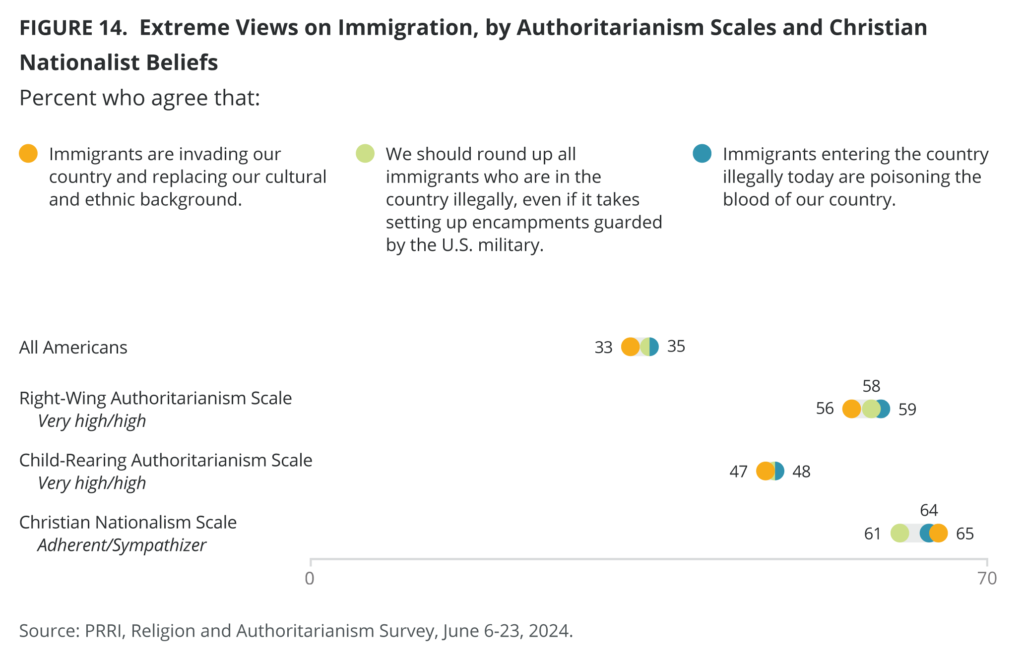
[1] Adorno, T., Frenkel-Brunswick, E., Levinson, D., & Sanford, N. (1950). The Authoritarian Personality. Harper Press.
[2] Altemeyer, B. (1981). Right-Wing Authoritarianism. Winnipeg: University of Manitoba Press.
[3] Respondents’ answers across all four questions are highly correlated, with a Cronbach’s alpha of 0.90, indicating a high degree of reliability for the scale.
[4] Fewer than 2% of respondents declined to answer all four statements. They were added to this group.
[5] The original Right-Wing Authoritarian Scale was criticized for using measurements that were too closely aligned with the rhetoric of the political right, thereby conflating authoritarianism with conservative ideology. Pérez, E. O., & Hetherington, M. J. (2014). Authoritarianism in Black and White: Testing the Cross-Racial Validity of the Child Rearing Scale. Political Analysis, 22(3), 398–412.
[6] The original child-rearing practices battery was developed by David Thomas and included 38 items, see Thomas, D. R. (1987). Authoritarianism and child-rearing practices. Australian Psychologist, 22 (2), 197–201. However, because the battery was too long to include in survey research, it was narrowed down to the modern four-item popularized by Feldman and Stenner (1997) and Stenner (2005) and later on by Hetherington and coauthors. See, Feldman, S., & Stenner, K. (1997). Perceived threat and authoritarianism. Political Psychology, 18(4), 741–770., Stenner, K. (2005). The Authoritarian Dynamic. Cambridge: Cambridge University Press; Hetherington, M. J., & Weiler, J. D. (2009). Authoritarianism and polarization in American politics. Cambridge: Cambridge University Press; Engelhardt, A. M., Feldman, S., & Hetherington M.J. (2023). Advancing the Measurement of Authoritarianism. Political behavior 45.2 (2023): 537–560.
[7] Informed by the work of Hetherington and coauthors (2023, 2014, 2009), Stenner (2005), Feldman and Stenner (1997).
[8] Pérez & Hetherington (2014).
[9] Each scale component was measured by asking respondents to select between two preferred childhood traits and whether they felt strongly about that choice. Answers were coded from -2 (strongly supporting the authoritarian trait) to 2 (strongly supporting the autonomous trait). For each question, fewer than 2% of respondents declined to select a trait; these respondents were coded as 0. The scale ranges from -8 to 8, with a score of -8 classified as being the most authoritarian and 8 classified as the most autonomous. Scores of -8 to -5 are highly authoritarian; -4 to -2 are authoritarian; -2 to 2 are classified as mixed. Scores of 2 to 4 are autonomous, while scores of 5 to 8 are highly autonomous. The Cronbach’s alpha for this scale is 0.61, which is consistent with Cronbach’s alpha scores from the American National Election Studies over the last 30 years: 0.67 (1992), 0.60 (2000), 0.61 (2004), 0.59 (2008), 0.60 (2012), and 0.65 (2016).
[10] Throughout the report “other non-Christians” includes Muslim, Buddhist, Hindu, Unitarian Universalist, and other religions.
[11] Previous literature on the child-rearing scale argues that using the scale to measure authoritarianism across racial groups is problematic because both Black and white Americans understand the child-rearing items differently, making Black Americans appear more authoritarian than whites when that may not be the case. For more on this discussion, see Pérez and Hetherington (2014).
[12] PRRI has two major reports using our Christian nationalism scale: a national study released in February 2023 and a study with results for all 50 states released in February 2024. Respondents were asked whether they completely agree, mostly agree, mostly disagree, or completely disagree with each of the following statements: (1) The U.S. government should declare America a Christian nation. (2) U.S. laws should be based on Christian values. (3) If the U.S. moves away from our Christian foundations, we will not have a country anymore. (4) Being Christian is an important part of being truly American. (5) God has called Christians to exercise dominion over all areas of American society. For more information on the Christian nationalism scale, see PRRI’s most recent report: https://www.prri.org/research/support-for-christian-nationalism-in-all-50-states/
[13] Because this question was asked to half of the sample, there are not enough cases to report for Hispanic Protestants, other Protestants of color, Jewish Americans, and other non-Christians.
[14] Because this question was asked to half of the sample, there are not enough cases to report for Hispanic Protestants, other Protestants of color, Jewish Americans, and other non-Christians.
[15] Because this question was asked to half of the sample, there are not enough cases to report for Hispanic Protestants, other Protestants of color, and Jewish Americans.
Survey Methodology
The survey was designed and conducted by PRRI. The survey was conducted among a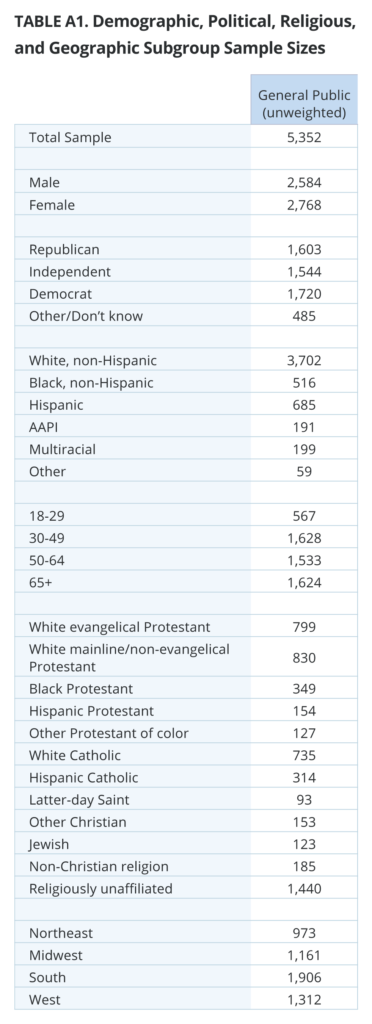 representative sample of 5,026 adults (age 18 and up) living in all 50 states in the United States, who are part of Ipsos’s Knowledge Panel and an additional 326 who were recruited by Ipsos using opt-in survey panels to increase the sample sizes in smaller states. Interviews were conducted online between June 6 and 23 2024.
representative sample of 5,026 adults (age 18 and up) living in all 50 states in the United States, who are part of Ipsos’s Knowledge Panel and an additional 326 who were recruited by Ipsos using opt-in survey panels to increase the sample sizes in smaller states. Interviews were conducted online between June 6 and 23 2024.
Respondents are recruited to the KnowledgePanel using an addressed-based sampling methodology from the Delivery Sequence File of the USPS – a database with full coverage of all delivery addresses in the U.S. As such, it covers all households regardless of their phone status, providing a representative online sample. Unlike opt-in panels, households are not permitted to “self-select” into the panel; and are generally limited to how many surveys they can take within a given time period.
The initial sample drawn from the KnowledgePanel was adjusted using pre-stratification weights so that it approximates the adult U.S. population. Next, a probability proportional to size (PPS) sampling scheme was used to select a representative sample.
To reduce the effects of any non-response bias, a post-stratification adjustment was applied. The needed benchmarks were obtained from the latest 2023 March supplement of the Current Population Survey (CPS), except language proficiency, which is not available from CPS, and was obtained from the 2022 American Community Survey (ACS). Additionally, the party affiliation benchmark was obtained from the Pew’s 2023 National Public Opinion Reference survey (NPORS). The post-stratification weight rebalanced the sample based on the following benchmarks: gender by age, race/ethnicity by gender, race/ethnicity by age, race/ethnicity by education, education, income, language proficiency, Census region by metropolitan status, and party affiliation. Additionally, we included individual states (50 states plus D.C.) to account for the oversampling of some states.
The margin of error for the national survey is +/- 1.58 percentage points at the 95% level of confidence, including the design effect for the survey of 1.4. In addition to sampling error, surveys may also be subject to error or bias due to question wording, context, and order effects. Additional details about the KnowledgePanel can be found on the Ipsos website: https://www.ipsos.com/en-us/solution/knowledgepanel
Press Coverage
14% of Republicans would 'take action to overturn' the election if Trump loses, study finds
 USA Today
USA Today
These U.S. religious groups couldn’t be more different in how they vote
 The Washington Post
The Washington Post




